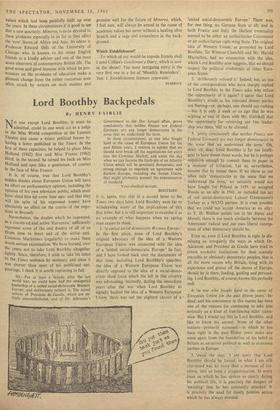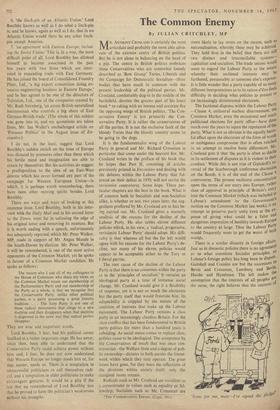Lord Boothby Backpedals
By HENRY FAIRLIE
No one except Lord Boothby; it must be admitted, could in one week act as a judge in the Miss World competition at the Lyceum
Theatre and cause a minor political furore by having a letter published in the Times. In the first of these capacities, be helped to place Miss Holland (1962) first and Miss France (1962) third; in the second, he turned his back on Miss Holland and spat (like a gentleman, of course) in the face of Miss France.
It is, of course, true that Lord Boothby's sudden doubts about European Union will have Ino effect on parliamentary opinion, including the °Pinion of his own television public, which must have sized him up some time ago; and that they Will (in spite of his expressed hopes) have absolutely no effect on the course of the nega- tions in Brussels.
Nevertheless, the doubts which he expressed, as a convinc-ed and active 'European,' sufficiently represent some of the real doubts of all of 'us (from time to time) and of the active anti- Common Marketeers (regularly) to make them worth serious examination. We have learned, over
the years, not to take Lord Boothby altogether lightly. Since, therefore, I wish to take his letter- to the Times sentence by sentence, and since it was shorter than most of his publicised out- P°urings, I think it is worth reprinting in full.
Sir,—For at least a decade, after the last world war, we could have had the undisputed leadership of a united social-deMocratic Western Europe; and deliberately refused it. The recent actions of President de Gaulle, which are en- tirely unconstitutional, and of Dr. Adenauer's
Government in the Der Spiegel affair, prove conclusively that neither France nor Federal Germany are any longer democracies in the sense that we understand the term.
In these circumstances, as one who fought hard in the cause of European Union for the past fifteen years, I venture to submit that we should now break off the negotiations for entry into the Common Market; and await the day when we can become the finch-pin of an Atlantic Union which will be genuinely democratic, and strong enough to negotiate an agreement with Eastern Europe, including the Soviet Union, that might ultimately prevent the extermination of mankind.
Your obedient servant, BOOTHBY.
It is, again, true that in a second letter to the Times two days later, Lord Boothby went far to withdrawing many of the implications of this first letter, but it is still important to examine it as an example of what happens when an ageing man ceases to think.
.1. 'a united social-democratic Western Europe.'
In the first place, none of Lord Boothby's original advocacy, of the idea of a Western European Union was connected with the idea .of a 'united social-democratic Europe.' In fact, and I have looked back over the documents of that time, including Lord Boothby's speeches, the idea of a Western European Union "viias directly opposed to the idea of a social-demo- cratic third force which the left in this country was advocating. Secondly, during the immediate years after the war when Lord Boothby so signally backed the idea of a Western European Union, there was not the slightest chance of a 'united social-democratic Europe.' There was, for one thing, no German State at ail; and in both France and Italy the likeliest eventuality seemed to be either an authoritarian Communist or an authoritarian right-wing State. The original idea of Western Union, as promoted by Lord Boothby, Sir Winston Churchill and Mr. Harold Macmillan, had no connection with the idea, which Lord Boothby now suggests, that we should inspect the political credentials of other Euro- pean States.
2. 'deliberately refused it.' Indeed, but, as one of the correspondents who have sharply replied to Lord Boothby in the Times asks, why refuse the opportunity of it again? I agree that Lord Boothby's Wards in his televised dinner parties are fleeting—or, perhaps, one should say rushing —but it is only a week or so ago that he was arguing at One of them with Mr. Gaitskell that -the opportunity Tor retrieving our lost leader- 'ship was- there, still to be claimed.
'prove conclusively that neither France nor Federal Germany' are any longer democracies in
the sense that understand the term.' Oh, dear; oh. dear. Lord Boothby is far too intelli- gent to have meant these words, but he is perhaps impulsive enough to commit them to paper in a moment of irritation. Let us, nevertheless, assume that he meant them. If we chose as our allies only 'democracies in the sense that we understand the term,' we certainly would not have fought for Poland in 1939, or accepted Russia as an ally in 1941, or included (an act of our social-democratic Labour Government) Turkey as a NATO partner. It is even possible that we could not accept America as an ally: as T. D. Weldon points out in ids States and Morals, there is not much similarity between the Americans' radical and our own liberal concep- tions of what democracy should be.
Even so, even if Lord Boothby is right in dis- missing so arrogantly the ways in which Dr. Adenauer and President de Gaulle have tried to create workable institutions for their scarcely tractable or obviously democratic peoples, that is all 'the more reason why Britain, lying with its experience and genius off the shores of Europe, should be in there, leading, guiding and persuad- ing. Lord Boothby, of course, knows this perfectly well.
4. `as one who fought hard in the cause of European Union for the past fifteen years.' In- deed, and his consistency in this matter has been one of the reasons for continuing to take him seriously as a kind of free-lancing elder states- man. But I would say this to Lord Boothby. and like to know his answer. None of the other matters—primarily economic—in which he has been right in the past fifteen years make any sense apart from the foundation of his belief in Britain as an active political as well as economic partner in Europe.
5, 'await the day.' I am sorry that Lord Boothby should be forced, in what I am still convinced was no more than a moment of irri- tation, into so lame a prognostication. In every issue on which he has spoken so clearly during his political life, it is precisely the dangers of 'awaiting' that he has constantly attacked. It is precisely the need for timely positive action which he has always stressed.
6. 'the linch-pin of an Atlantic Union.' Lord Boothby knows as well as I do what a linch-pin is; and he knows, again as well as I do, that in no Atlantic Union would there be any other linch- pin except America.
7. 'an agreement with Eastern Europe, includ- ing the Soviet Union.' This is, in a way, the most difficult point of ail. Lord, Boothby has allowed himself to become associated in the past few years with two firms which are inter- ested in expanding trade with East Germany. He has joined the board of Consolidated Foundry Plant, Ltd., 'a big export consortium doing ex- tensive engineering business in Eastern Europe,' and he has agreed to be one of the directors of Tolvision, Ltd., one of the companies created by Mr. Rudi Sternberg, 'an astute British naturalised businessman who controls a big share of East German-British trade.' (The whole of this subject was gone into in, and my quotations are taken from, Mr. Ian Walter's unchallenged article on 'Pressure Politics' in the August issue of En- counter.) I do not, in the least, suggest that Lord Boothby's sudden switch on the issue of Europe was dictated by pressures other than those which his fertile mind and imagination are able to create by themselves. But his activities do suggest a predisposition to the idea of an East-West détente which has never formed any part of the campaign for Western European Union—in which, it is perhaps worth remembering, there have been other moving spirits besides Lord Boothby.
There are ways and ways of looking at this immense issue. Lord Boothby, both in his inter- view with the Daily Mail and in his second letter to the Times, went far in softening the edge of his original letter and removing its nuances. But it is worth ending with a speech, unfortunately not adequately reported, which Mr. Peter Walker, MP, made in support of Mr. Angus Maude in the South-Dorset by-election. Mr. Peter Walker, it will be remembered, is one of the most active opponents of the Common Market, yet he spoke in favour of a Common Market candidate. He spoke as follows: The reason why I and all of my colleagues in the House of Commons who share my views on the Common Market retain our membership of the Parliamentary Party and our membership of the Party as a whole, is that we recognise that the Conservative Party, unlike other political parties, is a party possessing a great historic tradition. . . . The Tory Party is not one of those radical movements that clings to a new doctrine and then disappears when that doctrine is disproved in the same way that radical parties disappear. . .
They are wise and important words.
Lord Boothby, I fear, had his political career baulked at a rather important stage. He has never, since then, been able to understand that the Conservative Party could achieve power without him and, I fear, he does not now understand. that Western Europe no longer needs him or, for that matter, needs us. There is a temptation in unsuccessful politicians to call themselves radi- cal, and a temptation in older politicians to make extravagant gestures. It would be a pity if the last that we remembered of Lord Boothby was that he proved to have the politician's weaknesses without his strengths.







































 Previous page
Previous page